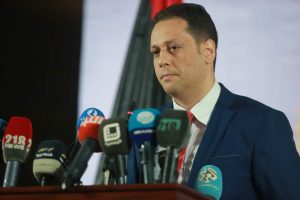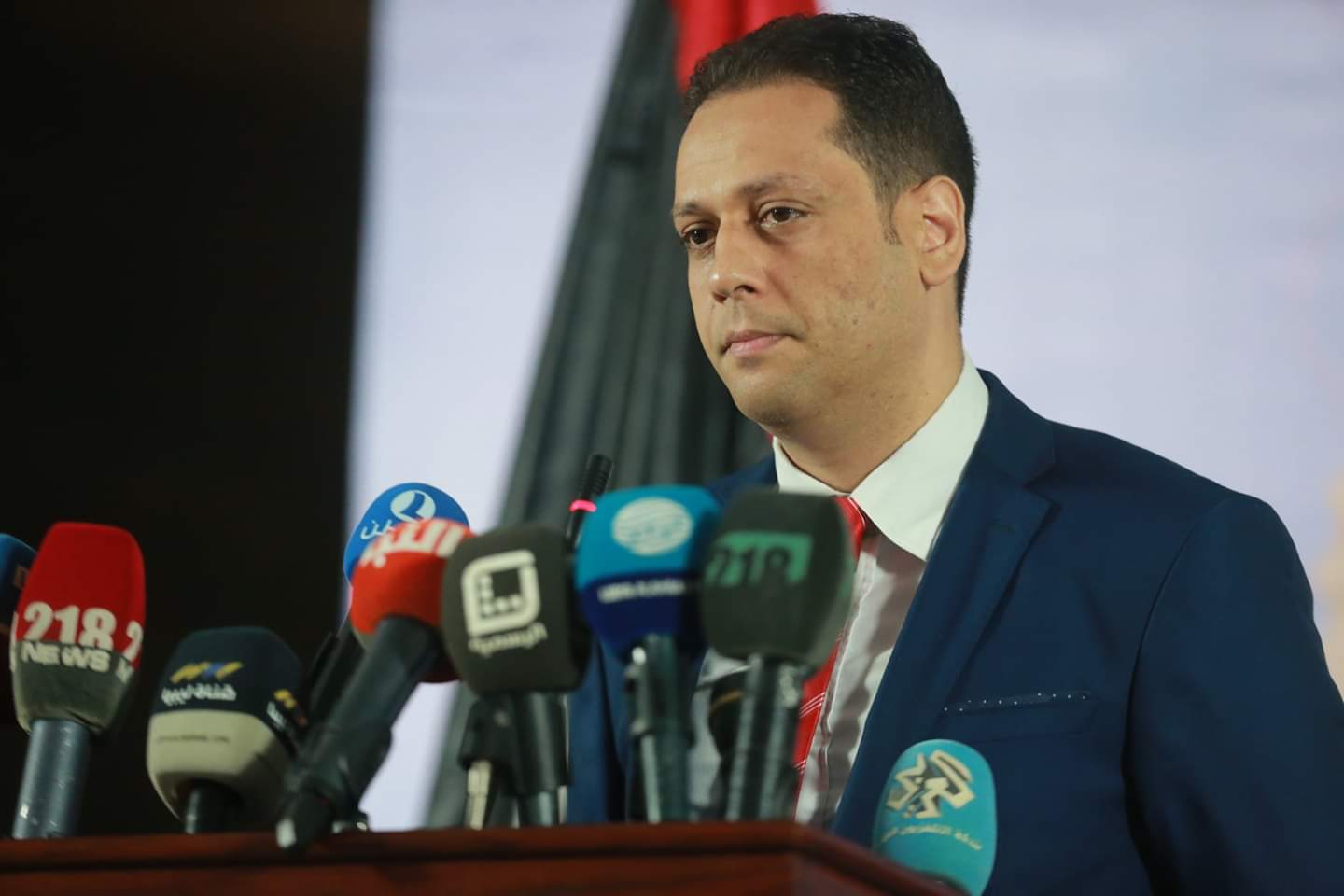By Sami Zaptia.

London, 23 October 2018:
The personal spokesperson for Faiez Serraj, the head of Libya’s internationally-recognized Presidential Council, Mohamed El-Sallak, confirmed Serraj’s full support for the unification of Libya’s military institution, and his continuous follow-up of this important negotiating process with the Government of National Accord-aligned army officers.
El-Sallak was speaking during Monday’s press conference held at the Media Center of the Prime Minister’s office in Tripoli.
He also spoke about the latest security arrangements, economic reform, a cabinet reshuffle and the Palermo Libya conference planned by Italy next month.
El-Sallak had failed to hold a press conference for weeks, most notably during the south Tripoli militia fighting.
Sallak said that Serraj stressed the emphasis on reaching a final agreement on the unification of Libya’s military, which requires clarification of the status of the civil authority represented by the Supreme Commander of the Army and its powers. Serraj is currently the Supreme Commander of the Tripoli-based Libyan Army.
Sallak said that negotiations were still ongoing until a final agreement is reached, stressing that the matter of the unification of institutions, especially sovereign ones, is inseparable from a comprehensive Libyan political solution.
While not mentioning him by name, Sallak was reacting to comments by Khalifa Hafter’s own spokesperson, Ahmed Mesmari, who had briefed about considerable progress being made at the Cairo Libyan army reunification talks.
Mesmari had implied that it was agreed at the talks that Hafter and his mainly eastern-based Libyan National Army (LNA) would be the main “facade” of the new unified army.
Sallak was keen to downplay these Mesmari statements, implying that these were simply renegotiating positions – until a comprehensive final agreement is reached.
Serraj was sending a clear message to the LNA and it’s commander Khalifa Hafter that any new unified national Libyan army must be democratically accountable under a civilian executive.
A 4,000-word document proporting to be a secret draft of what was agreed in the Cairo meetings was leaked yesterday. It contained huge details, including a main role for Hafter and his LNA in the new unified army. This still, however, does not prove that it was agreed upon by both parties.
Security Arrangements
With regard to the “Security Arrangements”, Sallak confirmed the completion of the final security arrangements plan and its entry into force in consultation and coordination with all parties.
Sallak was referring to the security arrangements agreed after the Zawia ceasefire agreement between the warring militias in south Tripoli at the end of August and early September this year.
The “security arrangements” refers to the terms of the Libyan Political Agreement (LPA) signed in the Moroccan city of Skhirat in December 2015 (LPA) whereby militias are suposed to remove their heavy weapons from urban centres. They also have the option of joining a non-militia-based accountable police or army.
There have been reports of a number of meetings between the Faiez Serraj authorities UNSMIL and militia leaders in which they have allegedly agreed to some sort of reform.
These include vacating their bases and handing over the security operations at a number of state locations.
It’s not clear how inclusive these militia meetings were and how far militias have agreed to being totally decommissioned.
Economic reform
With regard to economic reforms, El-Sallak said that the Presidential Council is following up on the implementation of the economic reforms approved in coordination with the Tripoli-based Central Bank of Libya.
These include reforming the process of opening documentary letters of credit at the official exchange rate, the performance of commercial banks in facilitating the sale of foreign currency at the new exchange rate and their application of new procedures.
El-Sallak pointed out that the coming period will see the treatment of the issue of fuel subsidies to complement the implementation of the package of measures to reduce the burden on the national economy and combat smuggling.
Ministerial reshuffle
With regards to the political dossier, El-Sallak revealed tha Serraj will continue what he referred to as his “political reforms” through a forthcoming ministerial reshuffle, in order to complement the earlier ministerial changes.
It will be recalled that Serraj had announced a ministerial reshuffle on 7 October, appointing two new controversial ministers at Interior and Economy.
The House of Representatives (HoR) had condemned the appointment of new Economy Minister Issawi, who has been implicated in the assassination of the commander of the anti-Qaddafi forces during the 2011 Libyan revolution, Abdelfatah Younis.
It will also be recalled that the HoR and the High State Council (HSC) have recently reached an agreement on the mechanism for restructuring the Serraj-led Presidency Council (PC).
When asked by journalists to comment about the HoR-HSC plan to restructure the PC, El-Sallak declined, adding that he recognized their authority under the terms of the LPA to restructure the PC and that the PC will continue to work normally in the meanwhile.
Most Libya analysts expect Serraj to be replaced in the jew slimline 3-member Presidency Council. Serraj’s ministerial reshuffle is seen as an attempt to delay or cancel this planned restructuring.
Libya November Palermo conference
With regards to the Palermo Libya Conference planned for November, El-Sallak confirmed that Serraj had received an official invitation from his Italian counterpart to attend the conference.
El-Sallak said that Serraj was committed to the need to produce concrete, positive results, translated into practical steps on the ground leading to a comprehensive political settlement to resolving the Libyan crisis.
Demolition of former Militia base

Replying to questions from journalists regarding the demolition of the Tripoli Girl’s Military Academy compound, Sallak claimed that the decision to demolish it was done “in coordination with Tripoli Municipality”.
The former Girl’s Military Academy is located in a prime downtown Tripoli location overlooking the Mediterranean sea. Since the 2011 revolution it has been used as a militia base.
Whilst Tripoli residents were pleased that the Nawasi militia had vacated it, they were puzzled by why all the buildings within it, estimated to be worth millions, were being demolished without any public debate.
However, when pressed by journalists and informed that Tripoli Municipality had claimed that they had demolished the buildings at the site on instructions from the Serraj PC, Sallak said that he would check and get back to the media on the matter.
Mysteriously, El-Sallak failed to make any comment whatsoever on the recent Tripoli militia assassinations nor the insecurity in the south of Libya.
https://www.libyaherald.com/2018/10/22/pc-refutes-reaching-final-agreement-on-army-reunification/
https://www.libyaherald.com/2018/10/18/serraj-invited-by-italy-to-palermo-libya-conference/
https://www.libyaherald.com/2018/10/17/hor-welcomes-hsc-approval-of-mechanism-for-restructuring-pc-introduces-its-own-amendments/
https://www.libyaherald.com/2018/10/11/cbl-not-delaying-economic-reforms-pcs-maetig/
https://www.libyaherald.com/2018/10/09/serraj-ministry-of-interior-says-militias-ready-to-handover-security-of-state-institutions/
https://www.libyaherald.com/2018/10/09/hor-denounces-serraj-appointment-of-issawi-as-economy-minister/
https://www.libyaherald.com/2018/10/08/serraj-conducts-controversial-ministerial-reshuffle/
https://www.libyaherald.com/2018/10/17/tripoli-militia-assassinations-could-spark-militia-war/







